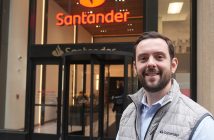What attracted you to real estate?
Initially, it was just the thought of investing. It was about taking an idea and putting your money where your mouth is, so to speak, and having that idea be successful. Real estate is something that’s tangible, something that can affect people’s lives on a daily basis. I thought the whole built environment is an interesting space to take part in and something that I would enjoy doing.
You’d been working in the field for a while. What technical skills did you gain from this master’s program that you might not have had before?
My track was a lot of cash flow models. There was one class called Real Estate Valuation and Investment Analysis that went through different investment scenarios, from development to buying a piece of land or buying a building. Then there was also the study on the debt side, including loan underwriting and investments across asset classes. It helped me understand how to value properties.
How much time did it take?
I took 12 credits my first semester, 15 the second, and then nine in the third. The 15 was really hard. It was in the middle of the summer and I was working about 30 hours a week, so it was tough having a social life. But it’s something I really wanted to do. It was worth it. It was fun going to class. I enjoyed doing it.
Now you work in property valuation and advisory with a pretty big firm; is that where you knew you were going to go after the master’s?
I feel like the M.S. in Real Estate gave me a pretty good base to go in a lot of different directions. I definitely could have gone into debt or equity. But the way I got the job was actually through the Fordham Portal. We had one specific for the master’s students in the real estate program and there was a job posting for a company that one of my professors worked at, so I talked to him about it. He spoke highly of the company.
In your current role as a real estate valuation professional, do you focus on commercial or residential property markets?
Commercial. One of my favorite classes at Fordham was the Real Estate Valuation and Investment Analysis course. Basically, what we did was just value different properties and value different deals. That’s what was the most fun for me, just looking at different properties and understanding what was going on with each one within the market.
Give me an example.
Well, I can give you the one I’m working on right now. It’s a parking garage portfolio. I never valued a parking garage before but it’s kind of interesting because they’re in L.A., and there are a couple in Cincinnati, so it’s understanding what is going on in those two markets and then coming up with the value. The one in Cincinnati is right outside of the NFL stadium and the MLB stadium, so that was a big factor.
The Real Estate Institute has a lot of working professionals teaching. How do adjunct faculty from the industry impact your learning? Do you feel you got the right mix of concepts, theory, and professional practice?
We had instructors who took a very academic approach when needed and that was great, but the majority of them as experts in their field spoke about their own experiences and what they were doing at that time. One professor was great, he talked about how he recently got a contract for a specific building and was saying what he would do with that building once he started managing it. He could speak to what he was doing on a daily basis. It’s two different teaching styles, but there was definitely a good balance between the theoretical and application to the real world.



